Despite being introduced only a few years ago, AI gained so much traction that even huge corporations implemented it in their workflow. This, therefore, will be today’s topic.
In this piece, we’ll see examples of artificial intelligence in business and how major ecommerce companies use AI to build the marketplace with significantly improved daily operations and simplified user journeys. This piece will serve as a great example for you, driving motivation and ideas for implementing AI in your products.
Alibaba's AI innovations
Despite being one of the world's largest ecommerce giants, Alibaba Group didn’t hesitate to pave the way for convenience and improvements by integrating AI into many parts of its operations. Like other companies, it aims to enhance efficiency, customer satisfaction, and overall business growth.
AI in customer service: Alibaba's chatbots
In its operations, Alibaba uses the power of chatbots to cater to an extremely huge audience. They offer 24/7 assistance to users worldwide and utilize self-learning algorithms to improve over time. As of today, Alibaba uses five AI chatbots as primary examples of AI technology.
- Wanxiang bot. This AI-powered chatbot assists merchants by answering questions about Taobao's rules, activities, and service issues.
- Alibee Shop bot. It helps users interact with end-user consumers on Taobao, handling service issues and direct merchant-to-consumer engagements.
- Alime bot. Aids end-user consumers through online and phone hotline channels. It uses text dialogues, graphics, videos, cards, and other means of communication.
- AI bot. This one works alongside Alime to proactively engage with users and mediate service disputes between consumers and merchants. It uses transaction and conversation data to evaluate disputes and make automated judgments.
- Dahuang bot. Trains customer service personnel by simulating a wider and more diverse range of consumer and merchant encounters than a non-AI-based training system.

Smart logistics and inventory management
Alibaba has also integrated AI into its logistics and inventory management systems to simplify the workflow and reduce costs on its management. It has a dedicated tool called AI Supply Chain which is both implemented on the platform and can be used by other services.
First off, it comes as an out-of-the-box solution. You can deploy it in virtual private clouds (VPCs) or implement as a SaaS offering without altering your existing technology infrastructure.
Additionally, it offers a timely supply chain synchronization, allowing you to connect data across the entire supply chain within seconds to expedite upstream and downstream responses, enable full-link collaboration, and prevent issues such as stockouts and supply chain disruptions.
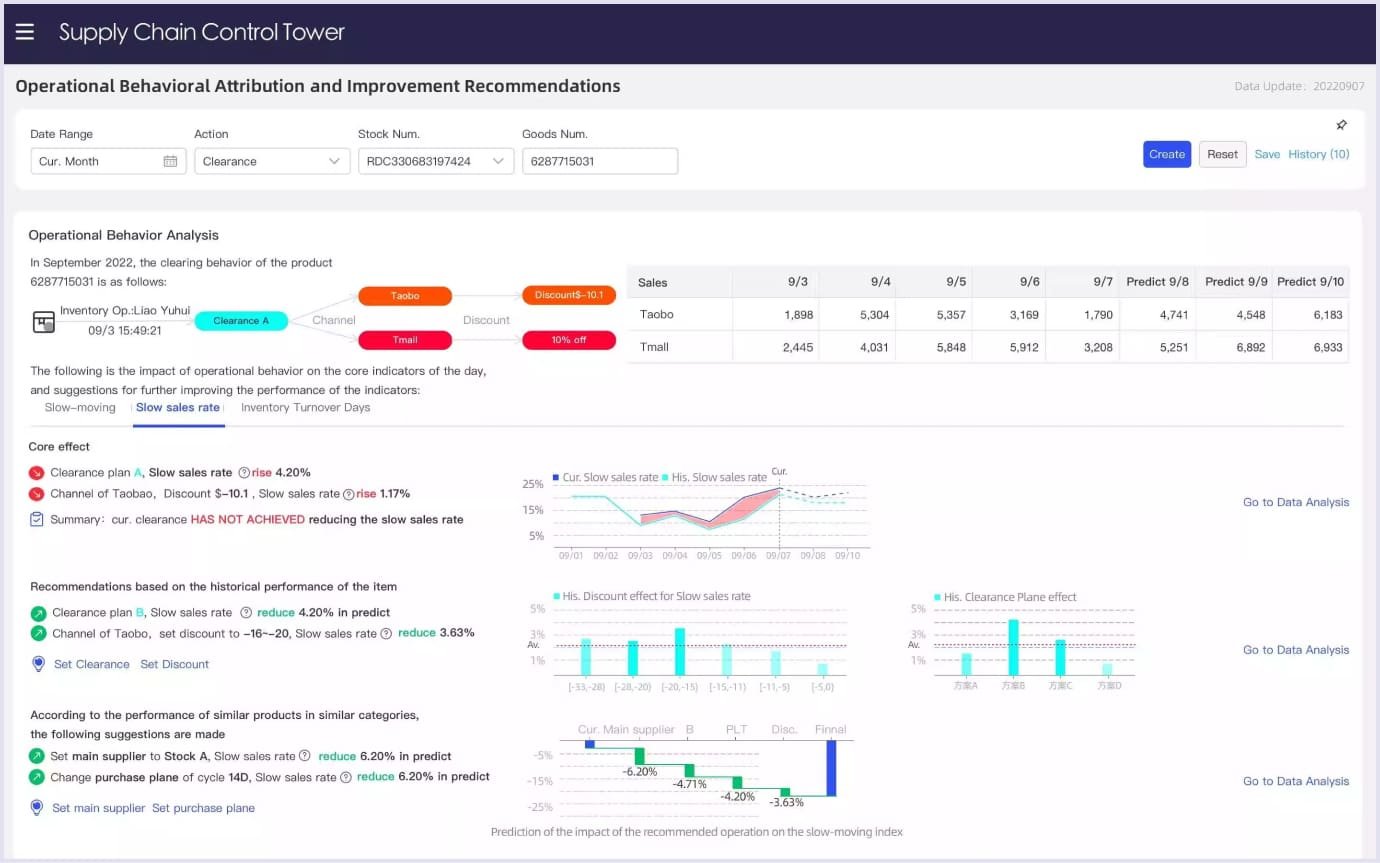
Besides, this solution assesses your inventory using key metrics such as the supply chain health index, capital backlog, and out-of-stock losses. It conducts optimization simulations to identify the root causes of issues, allowing you to swiftly determine optimization objectives and select strategies to balance stock levels and eliminate stagnation in your supply chain.
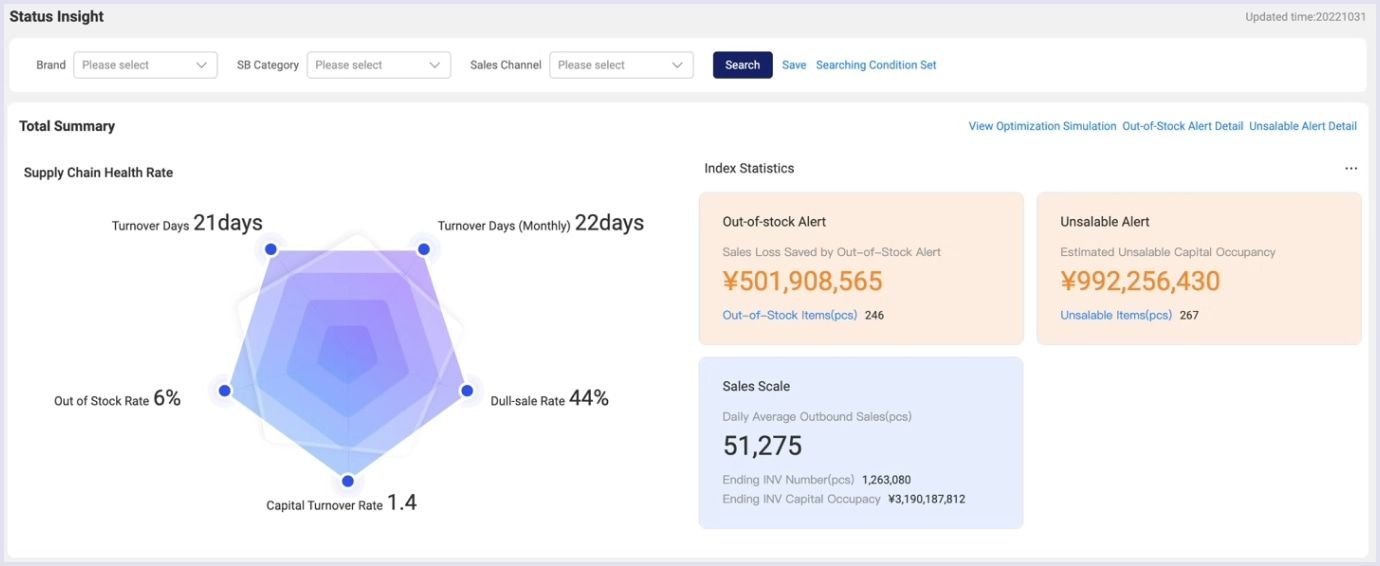
Lastly, it offers an accurate demand forecast, improving the accuracy by over 20% using a time series algorithm. This algorithm is tailored to your business needs and utilizes deep learning models based on industry best practices and your supply chain data.
Personalized shopping experience
In terms of improving the shopping experience, Alibaba offers Alibaba Cloud. It enforces AI and ML to analyze tons of data like user behavior and purchase history to deliver recommendations based on users’ specific tastes.
Alibaba Cloud’s machine learning tools offer predictive customer insights through comprehensive services, including:
- Data preprocessing;
- Feature engineering;
- Model training;
- Model prediction.
Employing all these tools, Alibaba Cloud offers its users:
Recommendation engines use AI algorithms to analyze a visitors’ browsing and purchase histories to offer and highlight products they are more likely to purchase. Needless to mention that such personalized recommendations improve buying experience and significantly boost the income for the platform.
Using AI, Alibaba implements dynamic pricing that can easily adjust prices based on demand and customer preferences without any human assistance. This ensures competitive pricing while maximizing profits.
With another integration, Alibaba AI makes visual search possible. It allows customers to provide images of products they are looking for while the system analyzes the image and provides links to the same or similar products on the marketplace. This innovation simplifies the search process and enhances user engagement.

Amazon's AI applications
Similar to Alibaba, Amazon also implemented AI in its daily operations, seeking the same benefits. Yet, it has a different toolset, so let’s look closer how Amazon uses artificial intelligence.
Read also: The Benefits and Steps to Building AI-Powered Ecommerce Apps
Amazon's Alexa and voice commerce
Alexa plays a huge role of artificial intelligence in Amazon. Amazon's Alexa, the company's AI-powered voice assistant, has become a central figure in smart home technology and voice commerce.
Alexa can be interacted with using voice prompts. Once the request is recognized, she takes care of tasks such as setting timers, creating reminders, managing smart home appliances, and much more. This hands-free convenience has made Alexa a popular choice in households worldwide.
On the ecommerce side, it’s artificial intelligence in Amazon allows integration with any shopping platform to facilitate voice commerce, where users can search for products, place orders, and track shipments using voice commands. This seamless integration streamlines the shopping process, providing customers a next-level comfort in shopping.
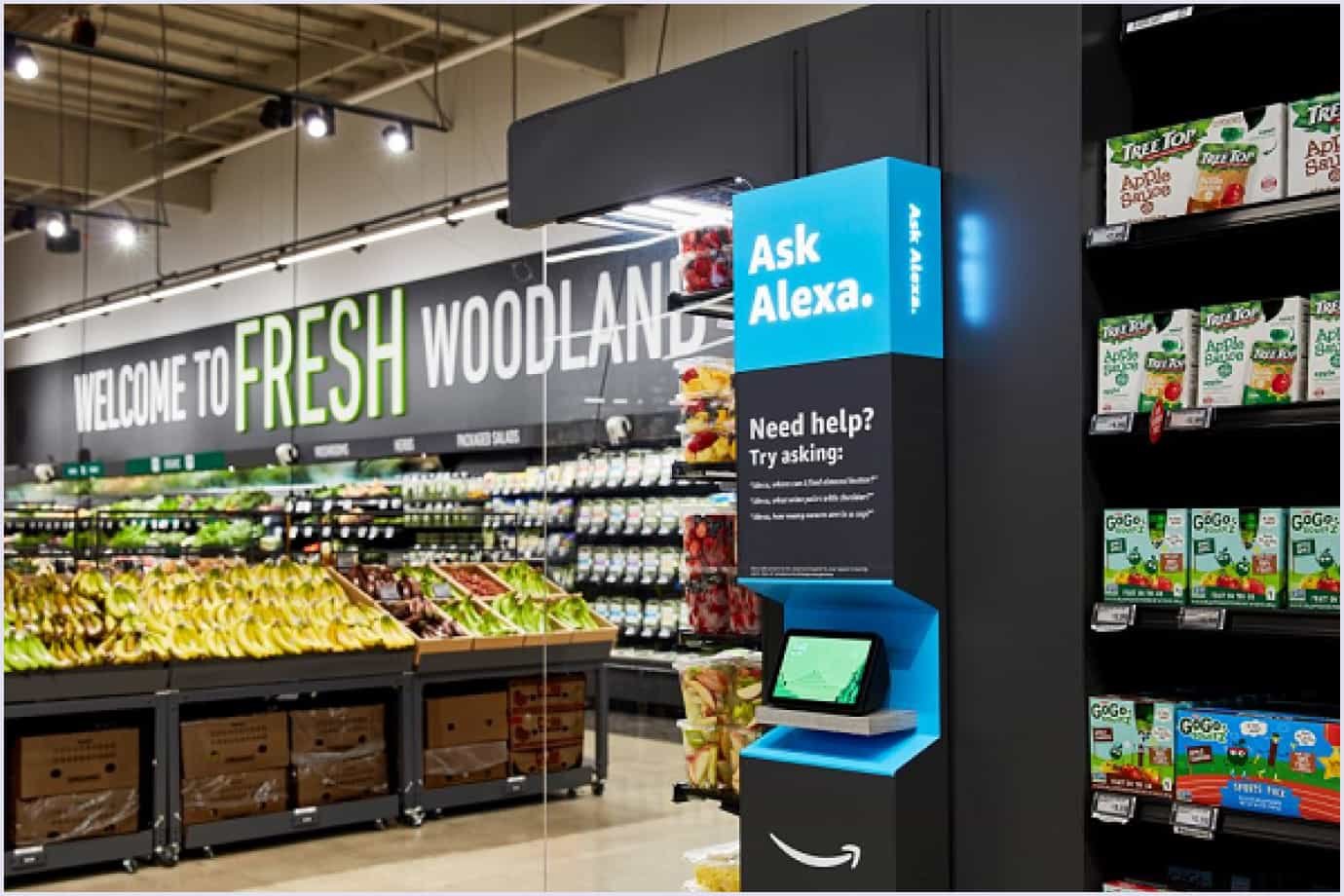
Besides, Alexa's advanced natural language processing model enables it to work with various user prompts and requests. This continuous improvement in language understanding allows Alexa to deliver super accurate and contextually meaningful responses over time.
But what really makes Alexa invaluable is its support of third-party skills and integrations, allowing users to extend its functionality. From ordering food to booking a ride, Alexa's expanding ecosystem continues to enhance its utility and versatility.
Amazon Go: AI-powered stores
Another innovation, Amazon Go, is a retail technology that uses AI to create a seamless shopping experience, removing the traditional checkout processes from the equation.
Amazon Go stores utilize a combination of deep learning, computer vision and sensor fusion algorithms. They, in turn, help the system see when buyers take, hold, or return product to the shelf. This technology tracks the items and puts them in a virtual cart once it is sure buyers are ready to leave the store. This way, people can simply come in, grab what they need and walk out of the store only to see that Amazon automatically charges them for all the purchases.
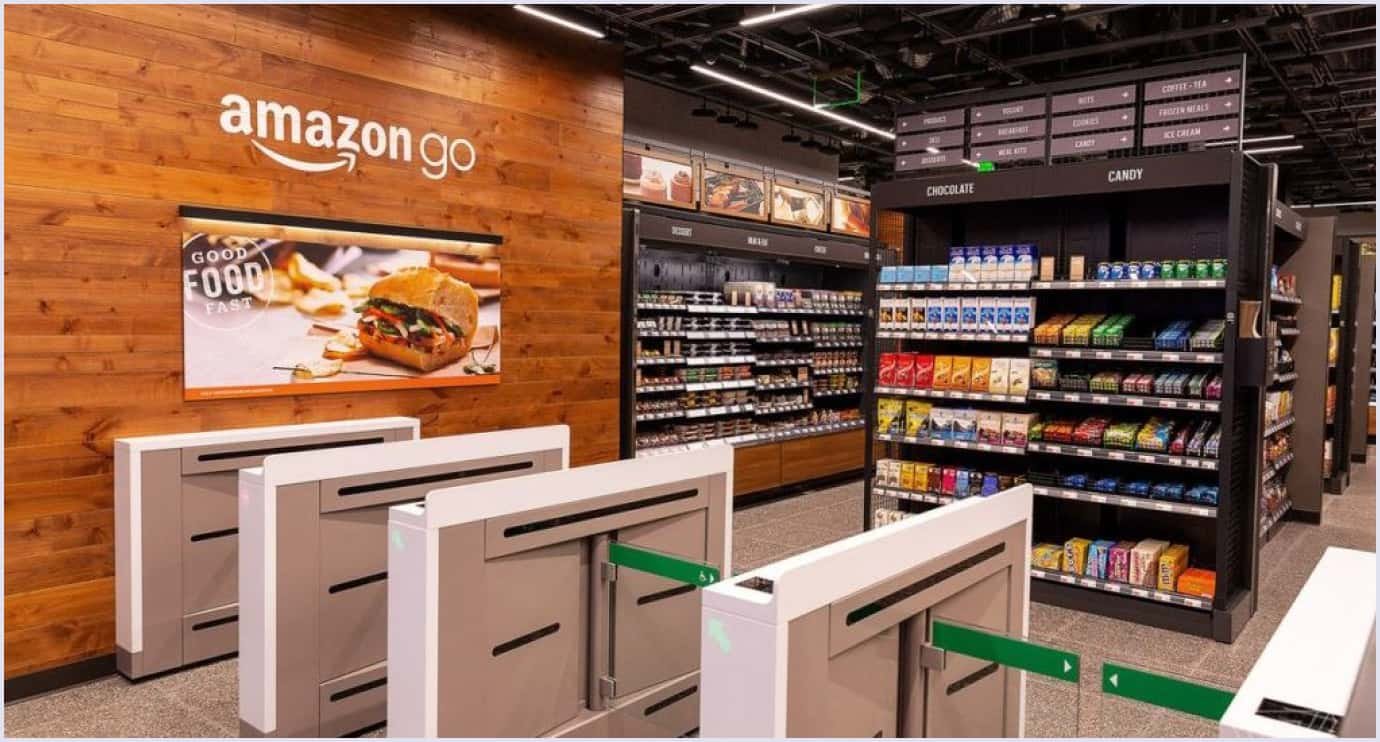
By removing an aspect of checkout lines, Amazon Go offers a very straightforward shopping experience. Customers can quickly grab what they need and leave, making it an ideal solution for busy locations and individuals.
Furthermore, the AI technology behind Amazon Go provides valuable data on each individual’s likings and behavior. This information helps Amazon optimize store layouts, manage inventory more effectively, and tailor promotions to individual customers.
AI in fulfillment and delivery
Amazon's fulfillment and delivery operations are among the most complex and efficient in the world, thanks in large part to AI technologies.
For instance, Amazon's fulfillment centers already use AI-powered robots that take care of transporting, sorting and packing all sorts of products. When all difficult work is done by robots, human workers can, instead, focus on productivity and accuracy in order processing.
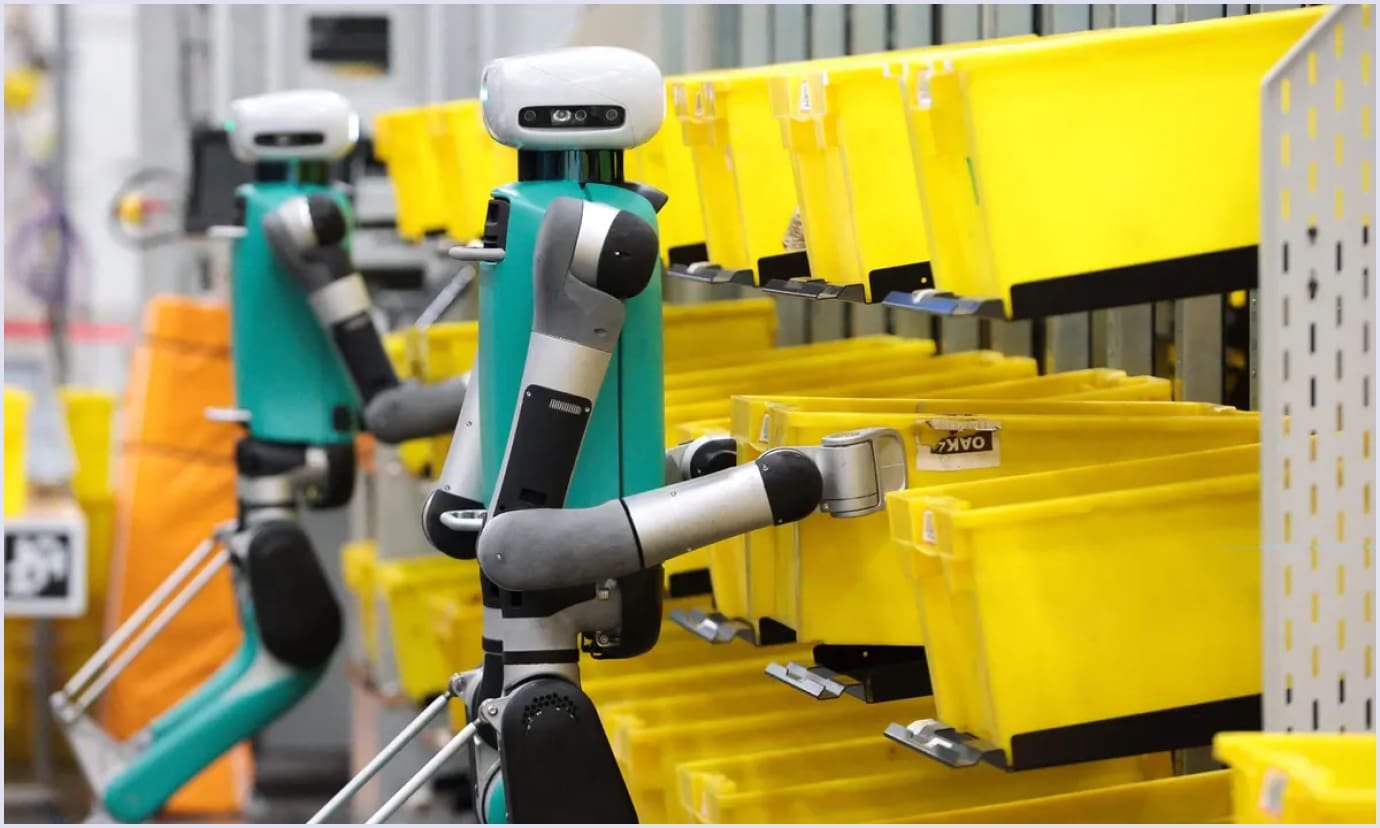
Amazon uses very high-end AI algorithms to analyze lots of aspects to predict which product are going to be in demand over a period of time, how to use inventory levels efficiently, and how to calculate effective delivery routes. This predictive capability ensures that Amazon can meet customer demands much quicker without compromising on quality or expenses.
Besides, its AI enables real-time tracking of shipments, providing customers with up-to-date information on the status of their orders. With this level of transparency, people can easily monitor their deliveries from the moment they are registered on dispatch right to the point when the order arrives at their doorstep.

AI in Walmart’s operations
Just like other companies, Walmart also has artificial intelligence software example, chasing the same benefits others get. In this case, Walmart’s AI usage can be boiled down to three key integrations.
Walmart Voice Order
Voice shopping is a great helping tool for customers both online and in offline stores. With Walmart Voice Order, users can connect their Walmart accounts to mobile devices and use them to give commands and ask the AI all sorts of things.
For example, simply asking AI to “add apple juice and a dozen eggs to the cart,” is more than enough! The system employs natural language processing (or NLP, in short) to process, read and understand the request. It, then, uses product name recognition database to identify all specific in the request. Moreover, it can even check prior purchase information to decide which brands certain users prefer.

Natural language understanding (NLU) helps quickly grasp the context of queries, whether they are new requests or follow-ups, ensuring the customer’s needs are met efficiently.
In addition to voice ordering, customers can also shop by texting Walmart using native iOS and Android apps. Text to Shop allows customers to do all sorts of things using a simple text conversation. Therefore, from this “command center” users can look for certain items, change positions/quantity in their carts, and even schedule pickups or deliveries.
Chatbots
Walmart’s chatbots, enhanced with NLU since 2020, have significantly improved customer service by handling millions of inquiries about order statuses, returns, and more. This allows human agents to shift attention to more difficult issues. The chatbots understand multiple languages and localized needs across countries like the U.S., Canada, Mexico, Chile, and India, ensuring efficient and accurate assistance.
Ask Sam
Walmart users also benefit from conversational AI. Similar to Amazon’s Alexa, the Ask Sam voice assistant helps buyers locate items, access store maps, check prices, view sales information, and more, just by asking questions like, “What aisle is hand soap located in?” or “What’s my schedule for tomorrow?”
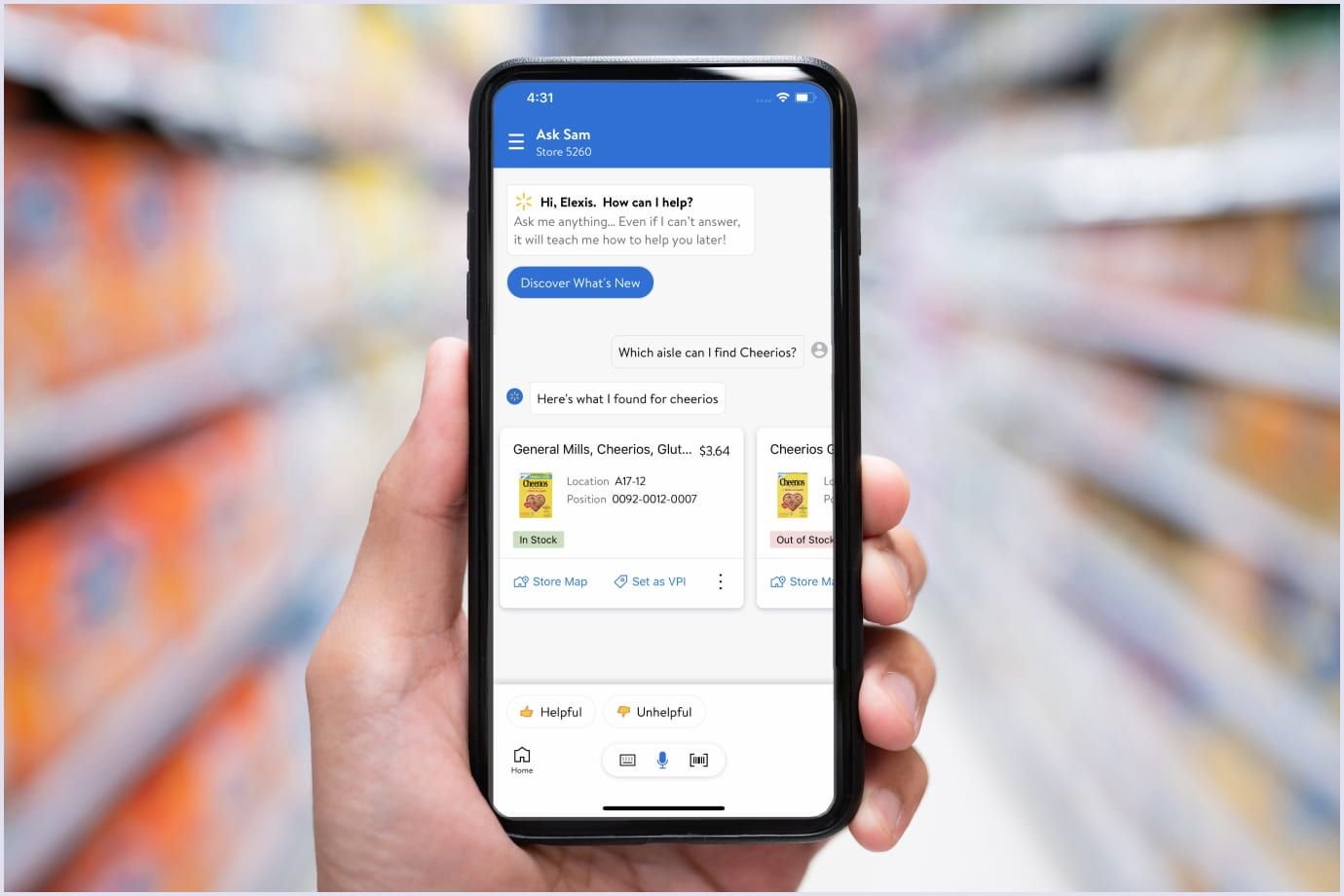
Conclusion
To wrap things up, we sincerely hope you noticed the trend: even huge corporations with extremely complicated operations do not hesitate to adopt AI in their daily use. This, in turn, leads to conclusion that AI integrations aren’t exotic anymore. Quit the contrary, they’re becoming a must have integration for any software product due to the valuable benefits they provide.
Thus, feel free to contact us once you’re ready to introduce AI to your product. Our expert team will gladly assist you guiding you through all the intricate processes of marketplace development services and other aspects.
